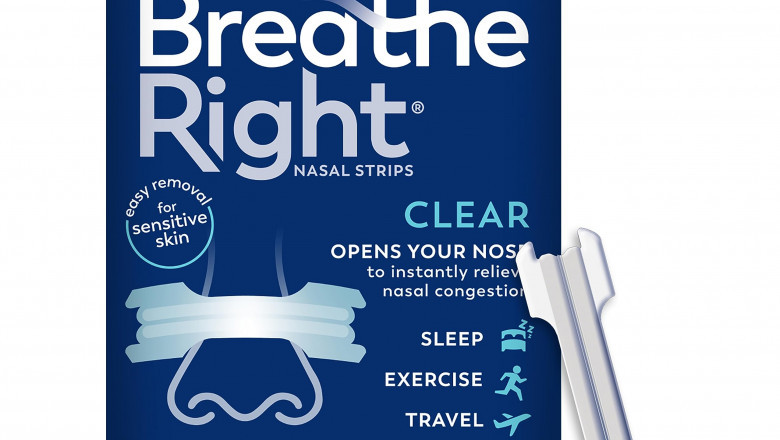views
Snoring might be a common problem, but it can create some seriously uncommon frustrations—for both the snorer and anyone within earshot. If you’ve ever searched for solutions, you’ve likely come across two popular options: nasal strips and nose snoring medicine, such as nasal sprays. While both are aimed at improving airflow and reducing snoring, they work in very different ways. Understanding how each one functions can help you choose the most effective and comfortable remedy for your needs.
Let’s dive into the key differences between nasal strips and nasal snoring medicines, and explore which solution may work best depending on the type and cause of your snoring.
Understanding Snoring: Why It Happens
Before comparing remedies, it’s important to understand what causes snoring in the first place.
Snoring occurs when airflow through the mouth and nose is partially obstructed while sleeping. This can be due to:
-
Congested nasal passages
-
Weak muscle tone in the throat or tongue
-
Structural issues like a deviated septum
-
Sleeping position (especially lying on your back)
-
Obesity or alcohol consumption, which can relax the airway muscles
Once the airflow is restricted, tissues in the throat or nose vibrate, producing that all-too-familiar sound. Treatments vary depending on what’s causing the obstruction.
Nasal Strips: Simple, Non-Medicated Relief
Nasal strips are external adhesive strips that stick to the bridge of the nose. They work mechanically by lifting the sides of the nose (specifically the nasal valves) to keep the airways open during sleep.
How they work:
-
Think of them as tiny springs that gently pull open the nostrils.
-
By physically opening the nasal passages, they improve airflow and reduce resistance in the nasal cavity.
-
They are most effective for people whose snoring originates from nasal congestion or narrow nasal passages.
Pros of nasal strips:
-
Non-invasive and drug-free
-
Easy to use and widely available
-
Immediate effect during use
-
Often helpful during colds, allergies, or when sleeping in dry environments
Cons:
-
May not help if snoring is caused by throat obstruction
-
Can lose adhesion if the skin is oily or sweaty
-
Not a long-term structural fix; it's a nightly solution
Nose Snoring Medicines: Medicinal Relief for Nasal Congestion
Nose snoring medicine, often in the form of nasal sprays or decongestants, aims to reduce inflammation or treat congestion that contributes to snoring.
There are two main categories:
-
Decongestant nasal sprays – Help shrink swollen blood vessels in the nasal passages.
-
Antihistamine or corticosteroid sprays – Target allergies or inflammation that may be contributing to airway obstruction.
How they work:
-
Reduce swelling in the nasal lining
-
Decrease mucus production or allergic responses
-
Improve breathing through the nose, especially during colds or allergy season
Pros of nose snoring medicine:
-
Effective for snoring related to allergies, colds, or sinusitis
-
Some sprays have long-term benefits if used correctly (especially corticosteroids)
-
May improve overall nasal health and reduce nighttime breathing difficulty
Cons:
-
Some decongestant sprays can only be used short-term (3–5 days) to avoid rebound congestion
-
Risk of overuse or dependence
-
Not suitable for all types of snoring, especially if caused by throat issues
-
Possible side effects like dryness, irritation, or nosebleeds
Key Differences at a Glance
| Feature | Nasal Strips | Nose Snoring Medicine |
|---|---|---|
| Type | Mechanical | Medicinal (chemical) |
| How It Works | Physically opens nasal passages | Reduces inflammation or congestion |
| Drug-Free | ✅ | ❌ (varies by type) |
| Suitable For | Mild nasal congestion, narrow nasal valves | Allergies, sinusitis, severe nasal congestion |
| Duration of Use | As needed | Some only short-term (e.g., decongestants) |
| Side Effects | Minimal (possible skin irritation) | Possible rebound congestion, dryness |
Which One Is Right for You?
Choosing the right solution depends on the root cause of your snoring:
-
If your snoring is due to nasal congestion from a cold or allergies, a nasal spray (especially antihistamine or corticosteroid) may be more effective.
-
If you snore mostly while lying on your back and have no nasal allergies or infections, nasal strips might be all you need to improve airflow.
-
If your snoring is constant and not relieved by either, you may need to explore other treatments like CPAP, dental devices, or consulting a sleep specialist.
For best results, some people combine both solutions—using a medicated spray to reduce inflammation and a nasal strip to support mechanical airflow. However, this should be done under medical advice to avoid any adverse effects from overmedication.
Final Thoughts: Know Your Nose (and Your Snore)
There’s no one-size-fits-all answer when it comes to snoring solutions, but understanding the differences between nasal strips and nose snoring medicine is a great first step. Nasal strips offer a simple, drug-free way to open nasal passages, while medicinal sprays target inflammation and congestion more directly.
Whether you’re looking for short-term relief during allergy season or exploring long-term strategies for quieter nights, identifying the cause of your snoring is key. And if all else fails, a visit to a sleep specialist can help you get a clear diagnosis—and maybe finally a silent night.






















Comments
0 comment